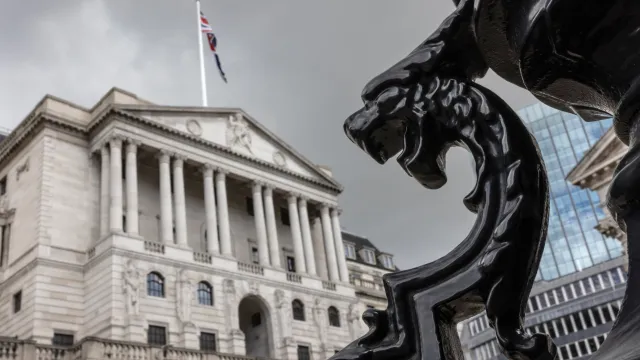The Bank of England’s Monetary Policy Committee (MPC) is poised for another meeting on 21 September, and all eyes are on whether they will increase interest rates once more. Since the last time they met, interest rates have been on a relentless upward trajectory. However, this upcoming meeting might mark a turning point in the cycle. Let’s delve into the factors shaping this critical financial decision and its potential repercussions.
A History of Rate Hikes
Since the previous decision to hold interest rates steady, the MPC has convened 14 times, and each time, they’ve pushed the base rate higher. This consistent pattern has left many wondering if the trend will continue. According to a recent Reuters poll, economists predict that the Bank of England will raise the base rate one more time, reaching 5.50%. If this forecast holds true, it suggests that interest rates may peak sooner than anticipated, catching many by surprise. Previously, economists had expected rates to climb until early 2024.
The Quest to Tame Inflation
The primary driver behind these rate hikes is the Bank of England’s commitment to curbing inflation. In August, UK interest rates reached a 15-year high, climbing by 0.25 percentage points to 5.25%. This aggressive stance reflects the central bank’s determination to bring inflation, currently at 6.8%, closer to its 2% target. However, concerns are emerging that while higher rates could expedite the decline in inflation, they may have adverse effects on the UK economy.
Changing Outlook on Interest Rates
The prevailing consensus until recently was that interest rates would continue their ascent, potentially peaking around the 6% mark. Some economists even entertained the possibility of rates reaching 6.5% in June. However, recent economic indicators have shifted this outlook. Central banks, both in the UK and the US, are becoming more cautious about further rate hikes.
Balancing Act
The delicate balancing act faced by central banks involves weighing the need to combat inflation against the potential harm to households and businesses grappling with higher borrowing costs. The fear is that additional rate hikes could push the UK into a recession in the coming year. Early data from the S&P Global/CIPS Purchasing Managers’ Index (PMI) indicates a contraction in the UK manufacturing sector, hinting at an economic downturn in the third quarter.
In the US, despite lower inflation rates compared to the UK, Jerome Powell, Chair of the US Federal Reserve, remains concerned about inflation. He acknowledges the risk of doing too little, allowing high inflation to persist, or doing too much, which could harm the economy.
The Bank of England faces a similar dilemma. Despite a recent drop in inflation, the central bank doesn’t anticipate reaching its 2% inflation target until early 2025, suggesting that interest rates might not come down anytime soon. Some analysts even predict a base rate drop to 3% might not occur until 2026. The upcoming release of August’s inflation data will play a pivotal role in the MPC’s decision next month.
Impact on Mortgage Rates and Housing
As interest rates rise, borrowing becomes more expensive, leading to an increase in mortgage rates. While mortgage rates have seen slight declines recently, they remain relatively high, with the average two-year fixed rate hovering around 6.75%, significantly higher than pre-2008 levels. This increase in mortgage costs has put pressure on homebuyers, with first-time buyer and home-mover purchases dropping by nearly a third.
Uncertain Future for the Housing Market
The housing market, which experienced a 20% surge during the COVID-19 pandemic, has begun to cool off. UK property valuations fell by 1.9% in August, marking the steepest drop for the month since 2018. This has extended four consecutive months of property market declines. Experts are divided on the future, with some anticipating a crash and others foreseeing a gradual decline. In any case, it may take some time before property prices start to rise again.
Anticipating the Peak
Whether you’re a saver or a borrower, the prospect of interest rates reaching their peak is likely a welcome sight. While low interest rates benefit individuals in various ways, they also contribute to increased demand for property, driving up prices. Higher savings rates offer a boost to cash holdings, with some easy-access accounts providing returns of over 5%. However, some experts suggest that savings rates may have plateaued and could potentially decrease.
If interest rates do peak in September, mortgage rates should stabilize, offering some relief to borrowers. However, prospective first-time buyers may still face affordability challenges. Renting could become a more cost-effective option, despite recent increases in rental rates.
Read Also: Will the stock market crash in September?
For those on variable-rate mortgages, the news of a potential end to the rate hike cycle brings hope. Variable-rate mortgages are favorable when rates decrease, but they can be burdensome when rates rise. Families who took out variable-rate mortgages last year hoping for rate reductions in 2023 have faced continued increases instead. Borrowers with fixed-rate mortgages set to expire should explore their options, as finding equally favorable terms may prove challenging.
In conclusion, the decision regarding interest rates in September will have significant implications for the UK economy, mortgage borrowers, and the housing market. While it remains uncertain whether this will mark the peak, it is clear that central banks are navigating a delicate path between combatting inflation and supporting economic growth. As we await the outcome of the MPC’s meeting, individuals and businesses must prepare for the potential impact on their finances.
Disclaimer: This article is for informational purposes only and does not constitute financial advice.
Read Also: UK house price predictions for next 5 years

